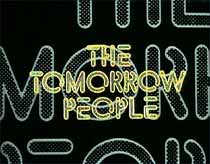 |
THE TOMORROW PEOPLE -A Guide to the series on DVDIf you're male and grew up in the 70s, the chances are that you remember the Thames Television series The Tomorrow People with great fondness. Although the series has gained a reputation for simply being cheap and kitsch over the years (quite justifiably), it still stands up remarkably well. Some of the stories have surprisingly decent science-fiction ideas at their core. Although the show's meagre budget often manifested itself in poor special effects and cheap-looking sets, the generation that grew up with the series won't have their illusions shattered by seeing the show again. It may raise a smile or two as you gaze in awe upon the jaw-dropping performance of Francis De Wolff as Jedikiah, or at the eye-popping 70s fashions, or at the sheer ineptness of some of the ambitious monster costumes, but you're unlikely to find yourself saying "whatever did I ever see in that?" The series is being released by Revelation, a small company whose early releases were widely criticised by fans (partly because they were poorly transferred, mastered and packaged, but also because the product they were selling was being bought by an unusually well-informed and fussy consumer base). The mastering problems are far from unique, of course. Most of the independent labels have limited resources, and when product is licensed in, it's usually an expensive up-front process, usually leaving little money to spend on refining your product to a similar standard that would be expected from one of the major players. There are also considerable risks in bringing a series like The Tomorrow People to DVD at all. While the series may have a certain cachet with genre fans of a particular generation, it's appeal across a broader cross section of the market is less easily predicted, and may be the factor that determines whether or not a product line is commercially viable. With a long-running series there's also the considerable burden of usually having to license the entire series, which may require considerable advance payment. All of these factors add up to create substantial risk, and require a steely nerve and confidence on behalf of the label's management.
It's fair to say that Revelation, like many other companies, was learning about DVD as they went along. Their first few Tomorrow People discs had some fundamental problems, which weren't helped by poor quality master tapes, sourced from 70s analogue tape formats. The company was obviously trying hard, though. It would have been easy for them to release the episodes without any supplementary material. They could be charging top dollar for bare-bones releases. Fortunately for the fans, they decided on a very modest price point, and opted to considerably increase the discs' value for money quotient by adding a commentary track, and other bits and pieces. Many fans would willingly pay a couple of pounds more for a bit of cleanup work, but Revelation need to service a secondary market: non-fans who are buying it solely for the nostalgia fix, and that audience is likely to be very price-sensitive. Go to:
|


 Revelation's early
cult releases were the product of a license from the BBC, which found them
in possession of the rights to a number of very desirable licenses when
the DVD format was new, and the consumer was starved of product.
Revelation had the DVD rights some impressive titles: the classic 50s
serial Quatermass and the Pit, eco-thriller series Doomwatch,
and Michael Palin's fabulous comedy series Ripping Yarns.
Unfortunately the BBC wasn't playing ball. They were unhappy that
Revelation's license could be interpreted to extend to the DVD format and,
as the license was nearing its end, stonewalled Revelation's request for
replacement masters that would allow the company to create discs
that took full advantage of the new format. You can't blame Revelation for
trying to make money from the assets they owned, and it's entirely
possible that had Revelation not issued the titles the did, that they
would still be unreleased, and gathering dust on some shelf in the BBC
Archives. It should also be noted that Revelation have made a commitment
to release the entire series on disc. Whether they'll achieve that remains
to be seen, of course, but it's something that the previous rights holder,
Video Gems were unable to do. They released a mere handful of episodes on
VHS, before abandoning the series, and its fans. (You may also care to
note that Video Gems never bothered with the formality of having the
episodes certificated by the BBFC, something they also "forgot"
to do with their Children of the Stones VHS release...)
Revelation's early
cult releases were the product of a license from the BBC, which found them
in possession of the rights to a number of very desirable licenses when
the DVD format was new, and the consumer was starved of product.
Revelation had the DVD rights some impressive titles: the classic 50s
serial Quatermass and the Pit, eco-thriller series Doomwatch,
and Michael Palin's fabulous comedy series Ripping Yarns.
Unfortunately the BBC wasn't playing ball. They were unhappy that
Revelation's license could be interpreted to extend to the DVD format and,
as the license was nearing its end, stonewalled Revelation's request for
replacement masters that would allow the company to create discs
that took full advantage of the new format. You can't blame Revelation for
trying to make money from the assets they owned, and it's entirely
possible that had Revelation not issued the titles the did, that they
would still be unreleased, and gathering dust on some shelf in the BBC
Archives. It should also be noted that Revelation have made a commitment
to release the entire series on disc. Whether they'll achieve that remains
to be seen, of course, but it's something that the previous rights holder,
Video Gems were unable to do. They released a mere handful of episodes on
VHS, before abandoning the series, and its fans. (You may also care to
note that Video Gems never bothered with the formality of having the
episodes certificated by the BBFC, something they also "forgot"
to do with their Children of the Stones VHS release...)